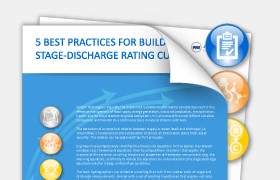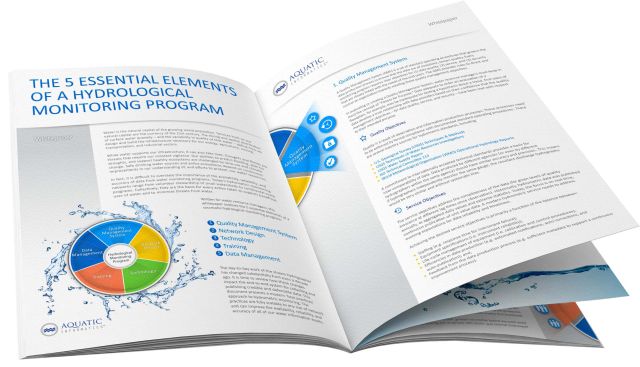2015 IAHS News
Whitepaper: 5 Best Practices to Build Rating Curves
As a friend of the IAHS, you're invited to read the whitepaper “5 Best Practices for Building Better Stage-Discharge Rating Curves.” Discover how highly effective hydrographers build better stage-discharge rating curves, quickly and efficiently.
The whitepaper is available here in 3 languages: English | Français | Español!
1. Have a Plan - discover best practices to modernize your quality management system, network design, technology & training.
2. Understand the Science - gain a clear understanding of current science & engineering principles behind rating curve development.
3. Systematically Analyze Your Data - use a hydraulics based approach to determine curve shape, slope & deviations.
4. Manage the Variance - understand & mitigate for sources of variance by adaptively managing your monitoring plan.
5. Qualify Derived Discharge Results - maintain records of data processing steps, data approval levels & quality grades.
A reliable rating curve is one that is credible, defensible, and minimizes re-work. Renowned hydrology expert Stuart Hamilton shares how you can build the best possible rating curves and gain the highest confidence in your calculations of flow.
Get your free whitepaper here!
About the Author: Stu Hamilton was a senior hydrometric technologist with Water Survey Canada for nearly 30 years and managed the operations of 500+ monitoring stations. He is an expert volunteer with WMO, ISO, NASH, and OGC. Stu is Senior Hydrologist at Aquatic Informatics – which provides the leading software suite to acquire, process, model, and publish water data.
Sent to you by the IAHS, on behalf of Aquatic Informatics.
This is not an endorsement of the Whitepaper or the AQUARIUS water data management system.
Prevention and mitigation of natural and anthropogenic hazards due to land subsidence
The peer-reviewed papers in this volume were presented at the Ninth International Symposium on Land Subsidence (NISOLS) 15–19 November 2015 in Nagoya, Japan. The volume is available open access as PIAHS Volume 372.
An awareness of problems related to land subsidence and its anthropogenic causes has been growing worldwide since the second half of the Twentieth century.
The problem of land subsidence was first included by the UNESCO program of the International Hydrological Decade (IHD), 1965–74, and later in the International Hydrological Program (IHP).
Land subsidence has become an important area of research in Japan, other countries of South East Asia and globally.
The proceedings of the NISOLS represents a body of high quality and globally relevant scientific and technical information for scientists, engineers, and other stakeholders concerned about land subsidence and the associated hazards.
Principal topics
Aquifer-system compaction and subsidence caused by groundwater withdrawal
Risk management of subsidence related hazards
Anthropogenic land subsidence in coastal regions
Land subsidence and liquefaction, due to East Japan Great Earthquake of March 11, 2011
Ground failure (fracturing, fault activation, fissuring)
Land surface displacement, measuring and monitoring
Numerical Modelling
Social, cultural and economic influence of land subsidence
Water management strategies
Whitepaper: 5 KEY Elements of Hydrological Monitoring
Written for water resource managers, the whitepaper “5 Essential Elements of a Hydrological Monitoring Program” presents the latest industry standards and best practices for improving the availability, reliability, and accuracy of data for today's water monitoring programs.
1. Quality Management System – read the latest international industry standards from the USGS, ISO, and WMO to improve your QMS.
2. Network Design - get tips to optimize the design of your network to meet your monitoring objectives and account for the complexity of your watershed.
3. Technology - consider new strategies for selecting technologies that can maximize your information-to-cost ratio over the lifespan of your devices.
4. Training - discover how training can help minimize procedural blunders resulting from errors in data collection and data handling.
5. Data Management - learn how modern systems help automate quality controls, build better rating curves, and publish defensible hydrological data.
Get your free whitepaper here!
About the Author: Stu Hamilton was a senior hydrometric technologist with Water Survey Canada for nearly 30 years and managed the operations of 500+ monitoring stations. He is an expert volunteer with WMO, ISO, NASH, and OGC. Stu is Senior Hydrologist at Aquatic Informatics – which provides the leading software suite to acquire, process, model, and publish water data.
Sent to you by the IAHS, on behalf of Aquatic Informatics.
This is not an endorsement of the Whitepaper or the AQUARIUS water data management system.
Whitepaper - Monitoring Water in Extreme Droughts
DISCOVER 7 BEST PRACTICES FOR MONITORING LOW FLOWS
July 2015 was the hottest month in recorded history according to NOAA! Extreme droughts around the world are creating an opportunity for hydrologists to record a historic event. Every drop counts. Every measurement counts.
Droughts are a global problem that require new hydrological insight. Authored by expert hydrologist Stu Hamilton, this new whitepaper presents 7 best practices for monitoring water during droughts.
Get your free whitepaper here!
Low flow monitoring presents new challenges and a chance to inform hydrological science and watershed management into the future. The most efficient path to a desirable water future is paved with data. Explore 7 ways to improve low flow monitoring in Stu's new whitepaper Monitoring Water in Extreme Droughts.
Sent to you by the IAHS, on behalf of Aquatic Informatics.
This is not an endorsement of the Whitepaper or the AQUARIUS water data management system.
Free live web-stream of International Gravel Bed Rivers Workshop
The Local Organizing Committee of the 8th International Gravel Bed Rivers Workshop (http://www.gbr8.dpri.kyoto-u.ac.jp/poster.html ) which took place in Japan on 13-19 September, 2015 invite you to view the recorded presentations in YouTube (GBR8 channel; https://www.youtube.com/channel/UC8oW0AbmlhcJYwvtTBrAAsA ).
Sessions 6, 9 and 11 did not have talks so these are not included.
Your students and colleagues may wish to watch the free video clips of the sessions, so please feel free to distribute this information.
Email problems now resolved
We were experiencing problems on the iahs.co.uk email accounts from 19th October to 26th October. All accounts are now restored.
Any emails in this period may not have been delivered so if you received a bounce back then please try to email us again using the same address.
We apologise for any inconvenience.
IAHS Membership
HIC 2016 12th International Conference on Hydroinformatics - abstract submission deadline extended to October 31st.
“Smart Water for the Future”
August 21-26, 2016 Songdo Convensia, Incheon, Korea
Website: http://www.hic2016.org
Click here to download the Call for Papers in PDF format
International Hydrology Prize – Call for nominations before 31st December
The International Hydrology Prize is awarded annually by IAHS, with UNESCO and WMO, to two people who have made an outstanding contribution to hydrological science and nominations are now open.
Nominations for the Prize are made by National Committees to IAHS, National Committees to the UNESCO-IHP or National Hydrological Advisors to the WMO, and forwarded to the Secretary General of IAHS for consideration by the Nomination Committee. The Committee consists of the President and a Vice-President of IAHS and representatives of UNESCO and WMO.
Two medals are awarded under the International Hydrology Prize: the Dooge medal and the Volker medal. Both medals are intended to distinguish outstanding achievements by hydrological scientists but with a different focus. The Dooge medal is aimed at fundamental contributions to the science of hydrology, whereas the Volker medal is aimed at outstanding applications of hydrological science for the benefit of society at large.
7th International Water Resources Management Conference - Abstract Submission extended to 7th November
Dear colleagues, 
Please find attached the flyer for the 7th International Water Resources Management Conference, which will take place at the Ruhr- University Bochum, Germany, from May 18th to 20th 2016.
The conference is entitled: 'The spatial dimensions of water management - Redistribution of benefits and risks'
I hope that this conference announcement will be attract you to participate and contribute.
Please be aware that the deadline for abstract submissions has been extended to the 7th of November 2015.
Detailed information is available at the conference website:
http://iahs-rub.hydrology.ruhr-uni-bochum.de/
Sincerely
Andreas Schumann
MOXXI - New developments

The Measurements & Observations in the XXIst Century (MOXXI) working group has been established to promote the advancement of novel observational techniques and to lead to new sources of information to help in better understanding the hydrological cycle. MOXXI provides a reference place to share novel, multidisciplinary, and often unintended approaches for the observation of hydrological processes.
MOXXI initiatives include organizing topical international meetings, hosting workshops at major hydrological conferences, promoting special issues in peer-reviewed journals, and organizing schools and hands-on courses on innovative observational methodologies in hydrology.
Since the 26th IUGG General Assembly in Prague, MOXXI’s website has a new appearance and hosts dedicated pages for the working group’s friends, events, publications, pictures, and laboratories (http://iahs.info/Commissions--W-Groups/Working-Groups/MOXXI.do). Further, regular updates on MOXXI’s initiatives are disseminated to friends through a newsletter. If you would like to know more about the group’s activities, please send your email address to anyone of the group’s executive team members:
Flavia Tauro ([email protected])
Rolf Hut ([email protected])
Theresa Blume ([email protected])




